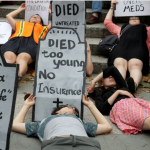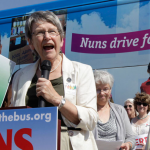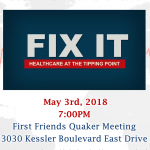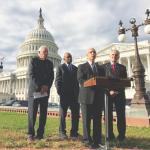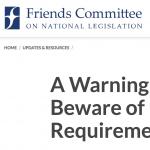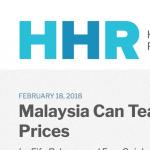A physician whose Christian faith leads him to care and advocate for his rural Indiana patients struggling with addiction and infectious disease. A Capitol Hill lobbyist whose Jewish faith leads him to fight in the halls of Congress to defend healthcare programs. A physician whose Muslim faith fuels her devotion to her low-income patients on the South side of Chicago.
All of these inspiring people, and thousands of others like them, are living testaments to the fact that all major religious traditions embrace a core responsibility to care for the sick. From creating history’s first-ever charity hospitals to presenting a unified front to defend programs like Medicare and Medicaid, the faith community has consistently acted on that mandate.
People of Faith for Access to Medicines was proud to partner with our close ally T1International to coordinate history’s largest demonstration protesting the skyrocketing costs of insulin. Over 80 persons affected by diabetes raised their voices on September 30th outside of insulin manufacturer Eli Lilly and Company headquarters. For a video account of the demonstration, go here. And for one of the several news accounts of the moving and powerful action, go here.
History shows that the successful social movements are the ones led by people directly impacted by injustice. (Civil rights, labor, women’s rights, anti-apartheid, etc.) Patients like Elizabeth Pfiester and her colleagues at T1International and the #insulin4all movement will be the ones to lead us to healthcare for all. Thanks to Truthout for publishing an article by PFAM's coordinator profiling Elizabeth and T1I.
All faith traditions have a mandate to ensure healthcare for our sisters and brothers in need, and an admirable legacy of providing that care directly. But they don't and can't reach everyone. So it is time for those communities to raise our voices in support of a proven system that guarantees care for all. Thanks to the National Catholic Reporter for publishing this article by PFAM's coordinator.
PFAM's Fran Quigley appeared on the public radio station WFYI's show No Limits , produced in partnership with Side Effects Public Media, to talk about our prescription drug pricing crisis. Other guests were Elizabeth Pfiester of PFAM ally and patient-led advocate T1International and Bob Herman of Axios Health media. Pfiester closed the discussion with an inspiring call to action for all with health challenges: “First, make sure your needs are taken care of. Then, if you have the time and energy, join us to advocate for changing this broken system.”
PFAM is grateful for our partnership with NETWORK Lobby. NETWORK is known for the wonderful “Nuns on the Bus” advocacy tours, but the team led by Catholic sisters fight for social justice every day, all year. Thank you to NETWORK for publishing this blog post about how the faith community can help lead the way toward affordable medicines for all. Click on the title to read more!
Governor Eric Holcomb plans to impose a new work requirement on the 400,000 people in Indiana who rely on the Healthy Indiana Plan (HIP) for their medicines and healthcare. The work requirement will go into effect in 2019. The Trump administration has given its seal of approval to the plan, and it is up to us to stop it in Indiana!
So far, enormous grassroots frustration with the price of prescription drugs has translated into sound bite rhetoric from leading politicians, but no meaningful reform.
No one stands in a better position to connect that agitation to real change than the patients for whom drug pricing is a matter of life or death.
This feature-length article tells the stories of two cancer patients—one in the U.S. and one in South Africa—to illustrate the possibilities for patients to seize leading roles in the movement to make medicines affordable to all, and the very real challenges these patients and their movement face.
In an important new collective statement, top leadership from multiple major faith denominations have strongly reaffirmed their traditions’ recognition of the human right to health, and insisted that trade agreements--including a renegotiated NAFTA--should not include terms that extend medicine monopolies.
PFAM coordinator Fran Quigley published an article in The New Republic, "Building a NASA for Prescription Drugs," about a patent-free, low-cost alternative for robust research and affordable medicine prices.
Nicole Smith-Holt’s son Alec died in Minnesota last June--after being forced to ration Eli Lilly’s Humalog insulin when Alec, a person with type 1 diabetes, could not afford the radically-increased price of the medicine. Ms. Smith-Holt wrote about Alec’s experiences in this February article. PFAM supported Ms. Smith-Holt as she attended the Eli Lilly shareholder meeting on May 7th...
Why do we Americans pay the world’s highest health care costs, yet still have such overall poor coverage? How can we make a change?
People of Faith for Access to Medicines – represented here by Sana Rizvi – is enjoying the opportunity to interact with hundreds of faith-motivated justice seekers at this year's Ecumenical Advocacy Days in the Washington DC area.
PFAM coordinator Fran Quigley published a new article about patient advocates for affordable medicines, available in the Washington Monthly.
PFAM coordinator Fran Quigley was interviewed by poet and editor Katy Giebenhain for the United Lutheran Seminary podcast, "The Seminary Explores."
People of Faith for Access to Medicines joined multiple Indiana nonprofit organizations this week in sending a letter to Governor Eric Holcomb calling for him to reverse his plan to impose so-called “community engagement” requirements on the 400,000-plus Hoosiers who are enrolled in the Healthy Indiana Plan.
PFAM coordinator Fran Quigley published a blog post for the Friends Committee on National Legislation entitled, A Warning from Indiana: Beware Medicaid Work Requirements.
PFAM's coordinator Fran Quigley published a column in today's New York Times about the exciting momentum for drug price reform in many U.S. states. You can read the article here.
This article was co-authored by Fifa Rahman and PFAM coordinator Fran Quigley and was originally published in the Health and Human Rights Journal on February 18, 2018. To read the article at its original source, and with references hyperlinked, click here.
This article co-authored by PFAM founders Dr. Chris Stack and Fran Quigley, along with Hoosiers for a Commmonsense Health Plan director Dr. Rob Stone, was published in the Indianapolis Star on January 4, 2018, and subsequently in several other Indiana newspapers. To read the article at its original source, click here.




